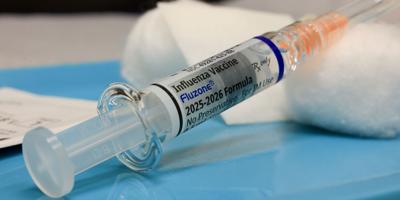As infectious disease expert Dr. William Schaffner puts it, this year’s flu and COVID-19 vaccination conversation has been “turbulent.”
First, the U.S. Food and Drug Administration licensed the COVID-19 vaccine for people ages 65 and older, as well as those younger than 65 with a chronic medical condition — creating a more specific target for the shot than in past years.
The American College of Obstetricians and Gynecologists opted to continue the previous recommendation that all pregnant women should get the vaccine. The American Academy of Pediatrics chimed in that COVID-19 vaccination in children ages 6 months to 2 years should be routine.
Then, the Centers for Disease Control and Prevention’s Advisory Committee on Immunization Practices last week endorsed scrapping the recommendation that those age 65 and older should get a COVID-19 vaccine, putting emphasis on individual decision and consultation with a physician. But the committee stopped short of saying people need a prescription for the shot.
That last statement is the most impactful — there is not a prescription required to get the latest COVID-19 vaccination.
Most people get their vaccines at pharmacies. While CVS’ and Walgreens’ websites cite FDA recommendations, the Nashville Banner’s Rachel Wells reported in mid-September that simply claiming she had an underlying condition was enough to get past the red tape.
Steady decline in MMR vaccinations leaves room for Tennessee cases
The CDC’s Advisory Committee on Immunization Practices (which Schaffner was formerly part of) was completely fired and replaced under Health and Human Services Sec. Robert F. Kennedy Jr. Schaffner points out that when he was involved, the committee worked together with professional societies and the FDA to make sure they were presenting a united front.
“When you had a set of recommendations, a sheet of music about vaccines that everybody used, then you got beautiful music,” says Schaffner, a physician at Vanderbilt University Medical Center. “When everybody’s playing their own song, you get noise dissonance, and that’s what we’re having now.
“It’s tumultuous, it’s uncertain,” he continues. “We’re concerned about the scientific basis that the current committee is using to make its recommendations. Confidence in this wonderful committee that has worked for 60 years in the United States developing vaccine policy — confidence in that committee is just plummeting. That’s very sad. It was so highly regarded.”
It’s correct that there should be special emphasis on the high-risk individuals being vaccinated this fall, Schaffner says, but that shouldn’t be confused with the sentiment that they’re the only ones who should be vaccinated.
Dr. Dontal Johnson, a pediatrician at Meharry Clinic, says parents he consults with don’t typically have a specific reason why they’re refusing vaccines for their children — just a general unease about what they’re hearing. He’s also taking care of a lot of young COVID patients in his clinic. Very young children and the elderly are most likely to get ICU-level ill, and the vaccine can prevent that. He recommends the American Academy of Pediatrics as a source for those who don’t see a pediatrician regularly.
“Especially in the past few years or so, we’re seeing a lot more hesitancy from people that we usually didn’t even expect to see hesitancy from,” Johnson says. “They’ve had other kids that have been vaccinated. They themselves have been vaccinated. Now they’re coming with more anxiety around getting their kids shots.”
The flu vaccine, on the other hand, is much more status quo. Everyone 6 months of age and older is recommended to receive the vaccine. The strains of flu currently circling are pretty much the same as they were last year, Schaffner tells the Scene. He doesn’t anticipate this year will match the severity of the flu epidemic of last year, but that doesn’t mean people should blow it off.
“If you’re young and strong, you are apt to get a milder infection,” Schaffner tells the Scene. “But every once in a while, a young, strong, completely healthy person gets hit with flu and finds themself in the emergency room and admitted to the hospital because they get that seriously ill. We can’t pick those people out in advance, so that’s why the recommendation is universal.”
The Metro Public Health Department is hosting a flu shot event on Oct. 21, after which all of the flu shots will be free. Otherwise, it’s $40 for the shot, and $85 for the high-dose shot.
While some pharmacies and doctors have the latest edition of the COVID-19 vaccine for 2025-26, the MPHD must await guidance from the state before it orders them. It’s still unclear how much it will cost, but the latest Advisory Committee on Immunization Practices decisions open the door to insurance coverage of the COVID-19 jab, and some states are requiring such coverage.
“I am encouraged by the fact that the ACIP made the decision that it’s individual decision-making, and having that conversation with your provider is so important,” says Dr. Laura Varnier, director of clinical services at the Metro Public Health Department. “I do think it has been, I guess you could say, more confusing this year, just with the different conversations that have been had. But I think having the individual choice is really empowering.”






